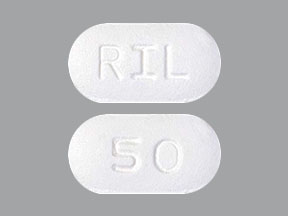Riluzole Disease Interactions
There are 4 disease interactions with riluzole.
Riluzole (applies to riluzole) alcohol
Moderate Potential Hazard, High plausibility. Applicable conditions: Alcoholism
Alcohol consumption may intensify the hepatotoxic potential of riluzole. Therefore, patients should be warned to limit alcohol intake while receiving riluzole therapy.
Riluzole (applies to riluzole) liver disease
Moderate Potential Hazard, High plausibility.
The use of riluzole has been frequently associated with an increase in liver enzymes between 3 and 5 times the upper limit of normal (ULN). Therapy with riluzole should be administered cautiously in patients with a history of liver dysfunction. Baseline liver function tests (LFTs) should be obtained in all patients. Monitor patients for signs and symptoms of hepatic injury, every month for the first 3 months of treatment, and periodically thereafter. The use of riluzole is not recommended if patients develop hepatic transaminases levels greater than 5 times the ULN. Discontinue riluzole if there is evidence of liver dysfunction (e.g., elevated bilirubin). Patients with mild or moderate [Child-Pugh score A and B] hepatic impairment had increases in AUC compared to patients with normal hepatic function, and may be at increased risk of adverse reactions. The impact of severe hepatic impairment on riluzole exposure is unknown.
Riluzole (applies to riluzole) neutropenia
Moderate Potential Hazard, Moderate plausibility.
The use of riluzole has rarely been associated with neutropenia with an absolute neutrophil count (ANC) less than 500/mm3. The neutropenia developed within the first 2 months of treatment. Therapy with riluzole should be administered cautiously in patients predisposed to neutropenia. Patients should be warned to report any febrile illness.
Riluzole (applies to riluzole) renal dysfunction
Moderate Potential Hazard, Moderate plausibility.
Riluzole and its metabolites are eliminated via the kidney. Therapy with riluzole should be administered cautiously in patients with renal dysfunction. Reduced clearance and higher plasma levels may occur in these patients. Women, native Japanese patients, and the elderly may metabolize or excrete riluzole at a slower rate. The need for dosage adjustment is not known.
Switch to professional interaction data
Riluzole drug interactions
There are 72 drug interactions with riluzole.
Riluzole alcohol/food interactions
There are 2 alcohol/food interactions with riluzole.
More about riluzole
- riluzole consumer information
- Check interactions
- Compare alternatives
- Pricing & coupons
- Reviews (9)
- Drug images
- Side effects
- Dosage information
- During pregnancy
- Drug class: miscellaneous central nervous system agents
- Breastfeeding
- En español
Related treatment guides
Drug Interaction Classification
| Highly clinically significant. Avoid combinations; the risk of the interaction outweighs the benefit. | |
| Moderately clinically significant. Usually avoid combinations; use it only under special circumstances. | |
| Minimally clinically significant. Minimize risk; assess risk and consider an alternative drug, take steps to circumvent the interaction risk and/or institute a monitoring plan. | |
| No interaction information available. |
See also:
Further information
Always consult your healthcare provider to ensure the information displayed on this page applies to your personal circumstances.


